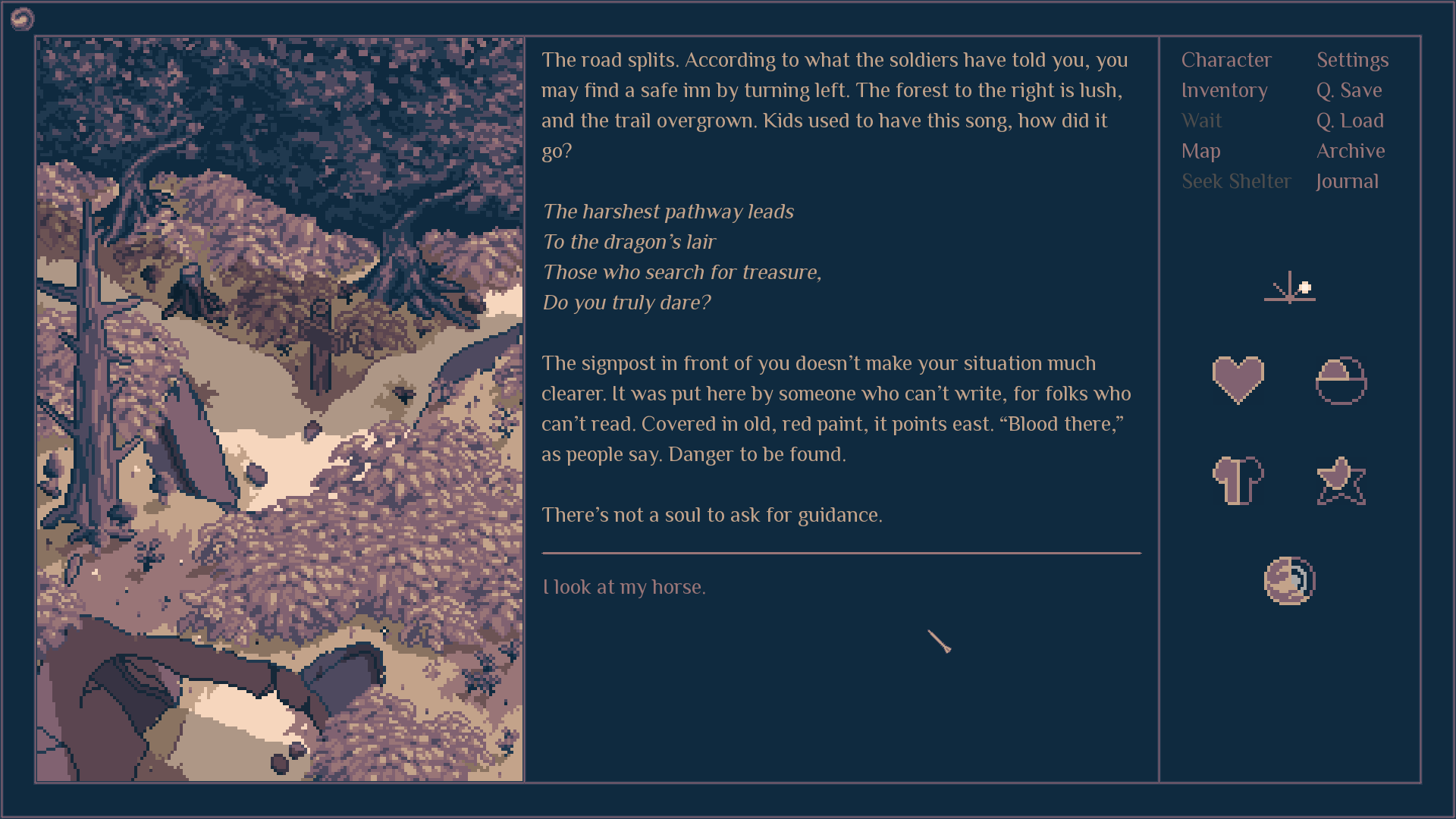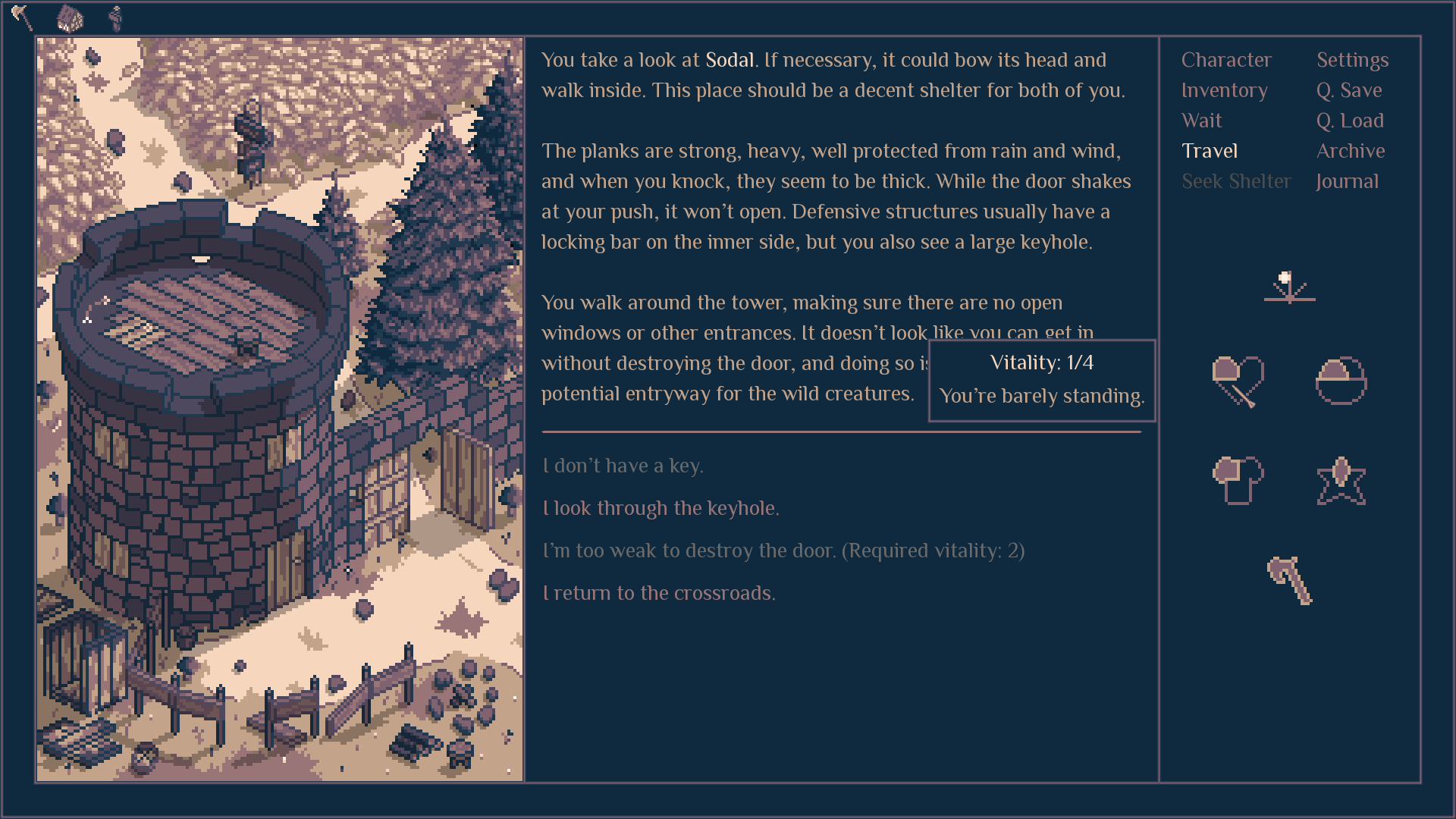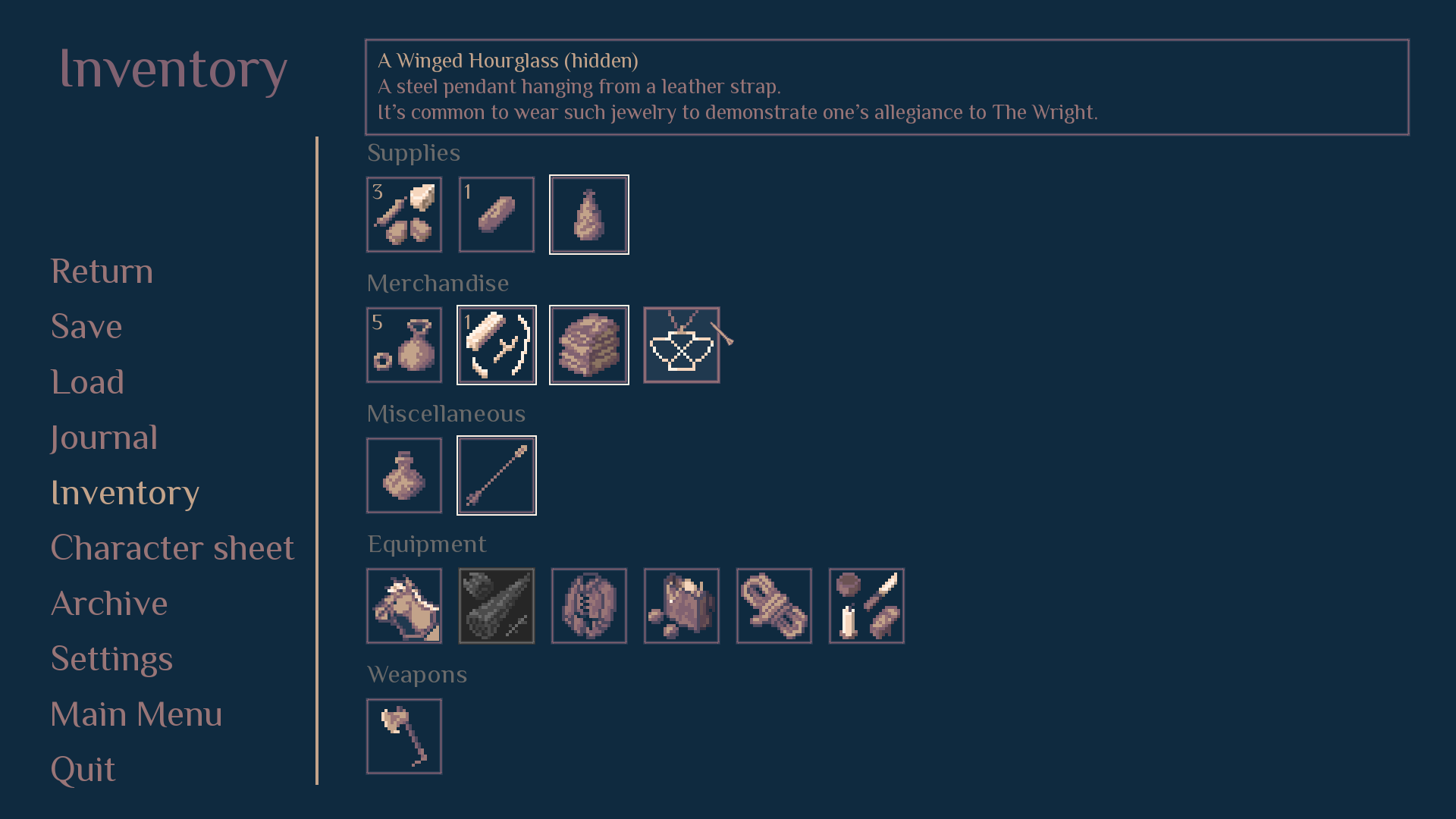Roadwarden: Exploring An Untamed Peninsula
A mix of text-adventure and RPG with an enthralling world to explore

Roadwarden is a game that oozes personality. I have no other way to describe the experience of exploring the peninsula in which the game is set, as it sucked me after the first 10 minutes of playing it. The premise is simple: you are a roadwarden — someone responsible for keeping communications open between cities in a region and helping to deal with whatever issues the inhabitants might be facing — sent to a remote peninsula to help pave the way for the merchant guild. Your mission is to establish contact with the tribes living there and increase their contact with the rest of the kingdom, which had its influence and power shattered after a brutal war.
Seems pretty simple, right? Yet, beneath this simple idea lies a depth of exploration and interaction that's uncommon for this kind of game. Not that games with a linear story are inferior — they are not — but as someone who really likes exploring fantastical worlds, I always welcome a game that executes branching dialogues and world exposition in a tasteful and thoughtful manner. Roadwarden is, without a doubt, one of these games.
Background
Roadwardens are lone wanderers by nature, and despite their status, the political power they carry means almost nothing at the fringes of the empire. In the forgotten peninsula where the game is set, people have been living for decades — or even centuries — without outside help, so just branding the authority appointed by the capital won't do much good. People here were hardened by adversity and proud of what they built. Since each tribe has its own identity, culture, religion, and needs, you will have to finesse the social interactions while learning, on the spot, how to handle each leader and their people. However, the game gives you a time limit — set in a number of days — to complete your objective, so there's no time to play safe.
And let me be clear: time is one of the most important resources in the game. You have a few stats to manage, like food (being well-fed makes some tasks easier), clothing (people will react differently to the way you're dressed or the state of your clothes and hygiene), and so on. They are not overly complex, but everything is there for a reason, and it all affects the world somehow. Time, however, is the only thing you are constantly losing and can't get back: being a medieval world, traveling from settlement to settlement takes time; doing any activity, like clearing debris from a road, takes time; being friendly to locals and spending some time with them…well, takes time. And you can only do these activities during the day, as monsters roam everywhere when night falls. Unlike your typical fantasy game, combat in Roadwarden is easily fatal, so it's heavily discouraged. And not only that, but night comes early with each passing day as Fall approaches.

The whole game carries a melancholic-yet-hopeful tone to it, and the developer did a great job in matching art, text, and music together, as the themes meld so well they are almost uncanny: the soundtrack by itself already brings a moody feeling of solitude and adventure so masterfully done that it's impossible to listen to it without reminding how it felt in the game. The art, despite having a limited color palette, does the same, and the pixel art is gorgeous to look at. This game is a labor of love carefully planned, and it shows.
Gameplay
Mechanically, the game is pretty simple, and that's one of the things that kept me obsessed with it, as I don't really have the patience to keep tracking stats, skills, attributes, and planning my level-ups — all this stuff usually takes me out of the immersion any game brings. I like to play my RPGs organically and usually end up being punished for it. Not with Roadwarden, though.
At the start, you select one of three classes, each with unique skills that can help in different ways. Being a highly reactive world, it is possible to have multiple playthroughs with the same class and arrive at different solutions for every situation through different approaches. The game only has four attributes — Vitality, Nourishment, Armor, and Appearance — that change dynamically according to the outcomes of what you do. Very simple, but very satisfying. There are also the skills that you get according to the class chosen, and that's it. This might seem really limiting, but in truth is more than enough, as I can not stress enough how reactive everything in this game is.
In the beginning, the peninsula's map is hidden behind a fog of war that you uncover as you explore. Being a text-adventure, the exploration happens by setting where you want to go, and the interface will show how long it will take to get there. Sometimes, random — and some not-so-random — events happen along the way that might eat your daytime hours. You'll always have to be careful with your journeys, and there are only a few places the roadwarden can safely rest, so you'll need to account for the time to go somewhere and back. When exploring an unknown part of the map, this can become especially tricky to manage, as there's always a little doubt of "should I risk it going forward, or it's better to go back and return tomorrow?". With the days ticking down, it's not always easy to decide.

Bear in mind that the game is not only exploration, though: you need food and shelter, and they aren't free. Part of a roadwarden's remit is to do odd jobs for people, carry messages, deal with threats, and so on, all rewarding you with much-needed coins, as nothing is free in the frontier. However, what would be a boring back-and-forth in a traditional RPG — who doesn't hate backtracking, after all? — is enriched by the prose, easiness of travel, and colorful characters. Each tribe has its own settlement, culture, religion, rules, and relations to each other. There will be a lot of back-and-forths between places, so there will come a time when you'll have to prioritize what to do, as there isn't enough time to do everything at once. This is one of the reasons making the game highly replayable, as it's impossible to see everything in one playthrough, even with careful planning.
Another reason for the high replayability is to see how events play when things go differently, or when you do some quests in another order. This game is full of conflict, political scheming, betrayal, abandonment, and resentment. The roadwarden needs to navigate through all of it, and even small tasks or deeds can have bigger effects later on.
Themes
One of the things that I loved about the game is that, despite being superficially a work of fantasy, it goes to great depths thematically. The most obvious one is the dichotomy of industrial progress vs. nature: the merchant guild wants to expand to the peninsula, but not everyone wants them there, some even wanting to keep the place untamed and with as little human presence as possible. As I previously said, people there built their life around hardships and braving the elements, they have everything they need and most don't want their peace and quiet disturbed. There are also people distrustful of the capital and their desire for gold, some even carrying heavy resentment against them due to past events. I'll not say any more to avoid spoiling the game, but the typical divide of "nature is good, civilization is bad" is not as clear-cut as it might seem.

Exploring this idea, Roadwarden is one of the few games that treats moral ambiguity with the carefe it needs. As the cliché goes, "there are no good and bad people, only hard choices", and this is true in this game. To some, the roadwarden represents something bad, but as time goes on, they get attached to you. On the other hand, people that might seem friendly could be hiding terrible secrets, or even trying to manipulate you. There's no way of knowing without leaning into the world and learning as much as possible about it. By the end of the game, when you return to the capital, you are told the consequences of your actions and find out if you were able to achieve your objectives.
Being a roadwarden is no easy task, but if you are tired of the typical heroic medieval fantasy and are looking for an unusual adventure, this could be well worth it. Jump on your horse, prepare your supplies, and come explore the peninsula. Who knows what you might find?